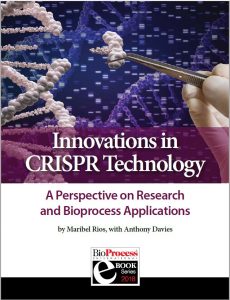 One of the fastest growing areas in genome engineering is research using the powerful editing tool of clustered regularly interspaced short palindromic repeats (CRISPR). When paired with the Cas9 (CRISPR-associated protein 9), an RNA-guided DNA endonuclease enzyme from Streptococcus pyogenes, the site-specific prokaryotic immune system can be used to cut and manipulate DNA strands in cells of patients with genetic diseases to treat, or in some cases, prevent such diseases. Within the past couple of years, CRISPR has been shown to improve signficantly the engineering of chimeric antigen receptor T cells (CAR-T cells) and to deliver CAR to specific sites within T cells. To gain a perspective on how the use of CRISPR is affecting research in genetic disease and may reduce costs in bioproduction, I spoke with Anthony Davies, PhD, chief executive officer and founder of Dark Horse Consulting.
One of the fastest growing areas in genome engineering is research using the powerful editing tool of clustered regularly interspaced short palindromic repeats (CRISPR). When paired with the Cas9 (CRISPR-associated protein 9), an RNA-guided DNA endonuclease enzyme from Streptococcus pyogenes, the site-specific prokaryotic immune system can be used to cut and manipulate DNA strands in cells of patients with genetic diseases to treat, or in some cases, prevent such diseases. Within the past couple of years, CRISPR has been shown to improve signficantly the engineering of chimeric antigen receptor T cells (CAR-T cells) and to deliver CAR to specific sites within T cells. To gain a perspective on how the use of CRISPR is affecting research in genetic disease and may reduce costs in bioproduction, I spoke with Anthony Davies, PhD, chief executive officer and founder of Dark Horse Consulting.
Just fill out the form to view and download the complete eBook.
